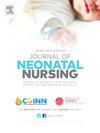Healthcare professionals’ perceptions of family centred care in neonatal intensive care units: A qualitative thematic synthesis
Q2 Nursing
引用次数: 0
Abstract
Background
Family-centred care is considered the gold standard in health care and despite a consensus about the benefits of this care for both critically ill infants and their parents, healthcare professionals in neonatal intensive care units often have difficulty implementing this care model consistently.
Aim
To explore healthcare providers' perceptions of factors influencing implementation of family-centred care in neonatal intensive care units.
Design
Qualitative thematic synthesis method.
Method
The systematic search of the literature was performed following PRISMA guidelines. Primary studies were identified from five databases, and full-text studies included in the review were assessed for quality using the Joanna Briggs Institute (JBI, 2017) checklist.
Results
Ten relevant primary qualitative studies were identified and included in the review. Two main analytical themes were identified: first challenges related to the NICU's culture including lack of clear policies, inadequate facilities, staffing, communication difficulties, and a lack of training and education for staff and parents, and second challenges related to parental roles and obligations.
Conclusion
The review highlights significant challenges and facilitators within the NICU environment, emphasizing the need for clear FCC policies, improved facilities, adequate staffing, and enhanced training and communication for both staff and parents. The findings underscore the complexities of parental roles, suggesting a critical need for better support and resources to help parents navigate their responsibilities effectively.
Impact statement
Incorporating family-centred care concepts in clinical practice through integrating guidelines and comprehensive staff training will significantly enhance family involvement. Addressing infrastructure deficiencies and resource shortages will minimize barriers for active family engagement, creating a more supportive environment for parents to be part of their infant care ultimately leading to better infant health outcomes.
医疗保健专业人员对新生儿重症监护室以家庭为中心的护理的看法:定性专题综合
以家庭为中心的护理被认为是医疗保健的黄金标准,尽管人们一致认为这种护理对危重婴儿及其父母都有好处,但新生儿重症监护病房的医疗保健专业人员往往难以始终如一地实施这种护理模式。目的探讨医疗保健提供者对影响新生儿重症监护病房实施以家庭为中心的护理的因素的看法。设计定性主题综合方法。方法按照PRISMA指南系统检索文献。从五个数据库中确定了主要研究,并使用乔安娜布里格斯研究所(JBI, 2017)检查表对纳入综述的全文研究进行了质量评估。结果确定并纳入了10项相关的初步定性研究。确定了两个主要的分析主题:第一个挑战与新生儿重症监护室的文化有关,包括缺乏明确的政策、设施不足、人员配备、沟通困难以及缺乏对工作人员和家长的培训和教育;第二个挑战与父母的角色和义务有关。结论本综述强调了新生儿重症监护病房环境中的重大挑战和促进因素,强调需要明确FCC政策,改善设施,充足的人员配备,加强对工作人员和家长的培训和沟通。研究结果强调了父母角色的复杂性,表明迫切需要更好的支持和资源来帮助父母有效地履行职责。通过综合指南和全面的员工培训,将以家庭为中心的护理理念纳入临床实践,将显著提高家庭参与。解决基础设施不足和资源短缺问题将最大限度地减少家庭积极参与的障碍,为父母参与婴儿护理创造一个更有利的环境,最终实现更好的婴儿健康结果。
本文章由计算机程序翻译,如有差异,请以英文原文为准。
求助全文
约1分钟内获得全文
求助全文
来源期刊

Journal of Neonatal Nursing
Nursing-Pediatrics
CiteScore
2.00
自引率
0.00%
发文量
143
期刊介绍:
Aims & Scope: This is the practical, bimonthly, research-based journal for all professionals concerned with the care of neonates and their families, both in hospital and the community. It aims to support the development of the essential practice, management, education and health promotion skills required by these professionals. The JNN will provide a forum for the exchange of ideas and information between the range of professionals working in this field; promote cooperation between these professionals; facilitate partnership care with families; provide information and informed opinion; promote innovation and change in the care of neonates and their families; and provide an education resource for this important rapidly developing field.
 求助内容:
求助内容: 应助结果提醒方式:
应助结果提醒方式:


